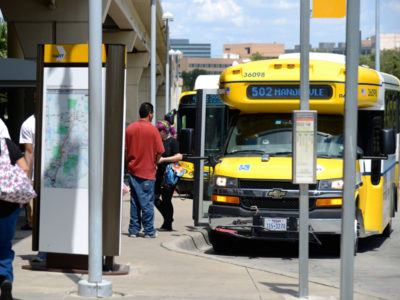 The success of a transit system will rise and fall on the strength and integrity of its scheduling, which directly impacts operating and capital costs, customer satisfaction, and operator wellness. As such, scheduling constitutes the foundation of any transit operation.
The success of a transit system will rise and fall on the strength and integrity of its scheduling, which directly impacts operating and capital costs, customer satisfaction, and operator wellness. As such, scheduling constitutes the foundation of any transit operation.
Agencies now have a guide to help them strengthen that bedrock, in the form of Transit Cooperative Research Program (TCRP) Synthesis 143, Managing the Transit Scheduling Workforce, produced by TTI Research Scientist Michael J. Walk. The new TRCP synthesis collects state-of-the-practice examples among agencies of varying sizes, geographic locations, and modes.
Download TCRP Synthesis 143, Managing the Transit Scheduling Workforce (may require a guest log-in)
“The report is designed to assist transit agencies in managing their transit scheduling human capital,” Walk says. “It provides those agencies with ideas and strategies to recruit, train, and retain good schedulers.”
Synthesis 143 examines how transit agencies recruit and manage schedulers, and also how agencies are evolving their practices to adapt to technological and industry changes. A literature review and agency survey provide background, and five case examples analyze strategies for recruitment, selection, training, retention and performance management of scheduling staff. The report also looks at how the increasing reliance on data analysis is reshaping the nature of a scheduler’s job.
“Transit scheduling is a human process that is assisted by software and data, and knowledgeable people are needed to perform most scheduling tasks,” Walk says. “It is a misconception that scheduling software reduces the need for qualified schedulers for the same reason that it would be a misconception to believe a spreadsheet program reduces the need for qualified accountants.”
“The scheduling process is labor intensive, detail-driven, and ripe with opportunities for errors,” Walk continues. “To be done well, scheduling requires qualified and talented transit schedulers.”
TCRP Synthesis 143 also highlights areas in which more study could further enhance transit operations. Those include: more streamlined training practices, toolkits designed especially for small transit agencies, how best to apply data sets to scheduling processes, and the potential implications of artificial intelligence and autonomy on the roles of fixed-route transit scheduling.
Note: Walk will be presenting the research on a National Transit Institute Webinar on July 23rd: https://ce-catalog.rutgers.edu/courseDisplay.cfm?schID=75740